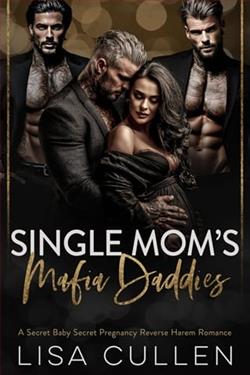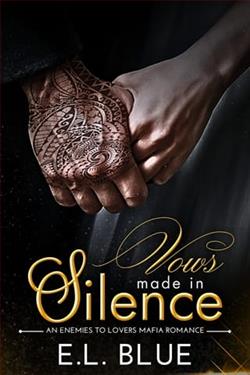Page 1 of The Best Husband Money Can Buy
Chapter 1
It was Emma Stone’s annual day for sadness.
She returned to her room after an exhausting session of trying to drum manners and mathematics into her charges, and found a letter waiting for her. The heavy, expensive paper and Vaughn seal were instantly recognizable, as was the exquisite script that said “Miss Emma Vaughn Stone.”
She picked the letter up with a sigh, not yet ready to open it. There was no need to, really. Inside, in the handwriting of the Duchess of Warrington’s secretary, would be an invitation to the annual Vaughn Christmas gathering at Harley, the family seat. Two weeks of talk and laughter and celebration among dozens of Vaughns of varying degree, with the duke and duchess presiding over the festivities.
Nostalgically she thought back to happier days when she’d attended every year. Troops of young cousins galloping through the house and grounds. Older Vaughns fondly remembering their shared past. Feasts that made the tables groan. The candlelit Christmas Eve service in the castle chapel. She could almost smell the roasting chestnuts…
Face set, she broke the seal and looked inside. The invitation was exactly like all the others, even though it had been over ten years since she had attended one of the gatherings. Ten long years, since her parents had died and left Emma impoverished.
Her mother had been a second cousin of the duke, and every year she had brought her husband and daughter for Christmas. Emma wondered how much longer it would be until she was dropped from the list. Even if she could take a fortnight off from her governess position, she would not go to Harley. She was too poor, too insignificant, to belong in that gilded world anymore.
It hurt to receive the invitation every year and know that she could not attend. It would hurt even more when the Warringtons finally stopped inviting her. The annual invitation was her last fragile connection to her happy childhood.
Unbearably restless, Emma caught up her cloak so that she could walk through the London streets. For the next few hours, she’d think of the past, a self-indulgence she allowed herself only once a year. By the time she returned to the Garfields’ house, she would be tired enough to sleep, if she was lucky.
Giving silent thanks for the fact that it was her half-day off, she went out into the raw December afternoon. As her long strides carried her east along the Strand, she thought of those distant golden holidays, and wondered what had happened to her grand relations. There was quiet young Lord Brandon, known as Brand, who was son and heir to the duke. He had two younger sisters within a few years’ age of Emma. And Cecilia, who like Emma was a distant cousin Unlike Emma, she was wealthy and beautiful.
And, of course, there was Anthony Vaughn, Brand’s best friend, another distant cousin who would someday be Viscount Verlaine. Five years older than Emma, Anthony had been the leader of the younger generation, outrageously handsome, and sometimes merely outrageous, but so charming that everyone always forgave him. On her last Christmas at Harley, it had been obvious that he and Cecilia were heading for a match. They’d made a stunningly attractive couple. Emma had come across them kissing in a corner once. She’d made an embarrassed retreat, unnoticed by the young lovers.
She had usually gone unnoticed, being plain and shy, but she didn't mind that. What mattered was that she had belonged.
Emma detoured to the Covent Garden market to buy herself a nosegay of flowers. It was an expensive luxury at this season, but one that she permitted herself now and then. To always watch every penny was bad for the soul. She loved flowers, and this small bunch of chrysanthemums would brighten her drab room for days.
She continued eastward into the old City of London, the financial and merchant district, until a glance at the gray sky showed that it was time to turn back. Though Emma did not worry overmuch about her safety during her walks, she knew better than to risk getting caught on the streets after dark.
On impulse, she decided to visit the church on the corner. Like most of the parish churches in the City, it was suffering as residents moved farther from London’s center. Still, the church was handsome, and it would be a welcome respite from the cold wind.
Inside, she sat for a few minutes and gave a prayer for her parents. They had died of a fever when Emma was at school in Bath. That terrible shock had been followed by another when she returned home to find that after the debts were paid, there would be no money left. Her amiable father had inherited a modest independence and spent every penny of it, along with his wife’s marriage portion. There would be no income or dowry for his daughter.
The day after Emma’s parents had been buried, a letter came from the Dowager Duchess of Warrington. In crisp, formal words, she offered the orphan a home at Harley. Even at fifteen, Emma had known what that meant—a lifetime as a poor relation, entitled to room and board in return for performing menial services for the duchess and other members of the household.
If she’d been pretty, she might have accepted. Many people came to Harley, and there might have been a man willing to marry an attractive girl with no dowry.
But Emma was tall and robust and unremarkable, with dark hair and freckles and eyes of shifting color that never stayed the same long enough to be called gray or green or hazel. If she’s gone to Harley, she would have spent the rest of her life—decades, probably—as an unpaid servant. Inevitably, she would be known as Poor Emma. That is, if she were noticed at all.
Luckily, there had been another choice. The headmistress of Emma’s school offered to let her stay and complete her education in return for helping with the younger students. Within two years, Emma had been a full-fledged teacher.
She quite enjoyed teaching, so when the headmistress retired and sold the school, Emma had become a governess. Usually governesses were older, but it was one profession where plainness was an asset. She’d spent several years with the family of a prosperous doctor. When the daughters no longer needed her, she’d taken her current position with the Garfields.
The Garfields. Emma sighed at the thought as she got to her feet and began to stroll around the church. There was much carved wood, and several fine funeral brasses.
She was almost ready to leave when she discovered a coffin lying in a side chapel. The pine box looked very stark, with no mourners or flowers or even any candles lit. Tucked in the corner where the rail met the wall was a book open to show blank pages. Curiously she looked closer, and saw a note asking those who prayed for the deceased to leave their name and address.
A harried curate emerged from the vestry and walked down the aisle past her. Hesitantly Emma said, “Excuse me, sir. Who was this man?”
The clergyman paused. “Though Harold Greaves was a member of this congregation, he never came to services, so I know very little about him. He was sixty-six years old. Died of an apoplexy, I believe. He’ll be buried tomorrow.”
“He had no family?”
“Apparently not.” With a nod, the curate continued on his way.
Emma stared at the empty condolence book. It seemed unbearably sad that a man should have lived sixty-six years and left no one to mourn.
For a moment she wondered who would mourn her death. Then, ashamed of the self-pity she’d been indulging in since receiving the invitation to Harley, she knelt beside the coffin and prayed for the soul of Harold Greaves. As she did, she imagined him as a small child. Since no infant survived without being fed and washed and tended, there must have been someone who cherished him then. In his sixty-six years, surely he had made friends. She prayed that he had known his share of happiness and satisfaction, and that his death had been swift and painless.
Gradually a sense of peace came over her. She hoped that meant Mr. Greaves was resting easy. A little stiff from the cold stone floor, she got to her feet. After a moment of struggle with her own selfish impulses, she laid her nosegay on the coffin. For her, there would be other flowers, but not for Harold Greaves. May his soul rest in peace.















